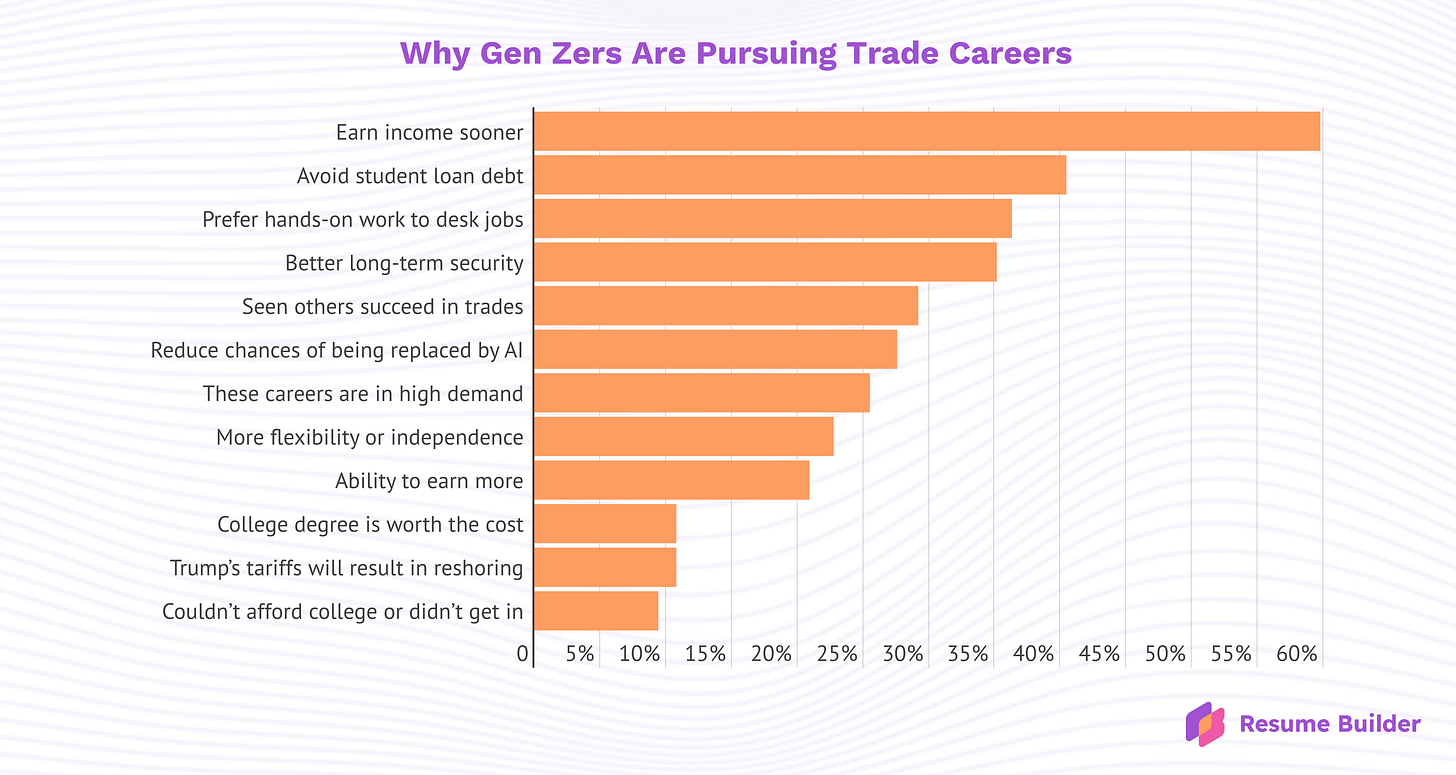Gen Z College Grads Are Choosing Trades And Calling Out the White-Collar Myth
Tired of debt, broken promises, and AI-proof careers that don’t exist, Gen Z is making a strategic shift and marketers, educators, and employers need to catch up.
We’re watching a fundamental shift in how Gen Z approaches work, one that’s practical, deliberate, and long overdue. More and more college-educated young adults are choosing skilled trades over office jobs, not because they’ve run out of options, but because they’ve taken a hard look at what those options deliver.
This isn’t a rebellion against higher education or white-collar careers.
It’s a calculated move rooted in experience and observation. I’ve seen it firsthand in the classroom: bright, capable students deciding that the straight path from degree to desk job no longer makes sense. They’re turning to trade schools, apprenticeships, and skilled work, not because they have to, but because it lines up better with what they want and need.
They’re not giving up. They’re choosing better.
You told them to follow their dreams.
They followed logic instead.
They looked at what a degree costs. Then they looked at what it pays back. Then they looked at what AI does to the jobs those degrees promised. And then they asked the question that more of us should have asked decades ago:
“Why am I paying six figures to sit in a cubicle praying I don’t get automated out of relevance?”
So yeah, they’re choosing blue-collar work with intention.
Stacie Haller Gets It. She Said It Out Loud.
“More Gen Z college graduates are turning to trade careers—and for good reason,” says Stacie Haller, Chief Career Advisor at Resume Builder. “Many are concerned about AI replacing traditional white-collar roles, while trade jobs offer hands-on work that’s difficult to automate.”
It isn't easy to automate. That’s not fear. That’s foresight. That’s Gen Z doing what brands always claim to do: "future-proofing."
But the bigger quote is this:
“Many grads find their degrees don’t lead to careers in their field, prompting them to explore more practical, in-demand alternatives.”
Translation: The pipeline's leaking, and Gen Z’s not wasting time trying to patch it.
MAC’s Angle: This Is the Receipts Era
Let’s break it down, Marketing Accountability Council-style:
We told Gen Z a college degree was the golden ticket.
If you’re marketing life success, it had better deliver. Gen Z saw through the fine print. And they’re done getting sold lofty dreams with zero grounding in reality.
We acted like trades were a fallback.
If you believe in equity and truth-seeking, you don’t rank professions based on vibes. You show all the paths. You market dignity, not status symbols.
We sold “authenticity” while pushing AI-written job descriptions for careers that barely exist anymore.
Authenticity isn’t a word. It’s an action. Don’t put it in your copy if you're not walking it.
This Isn’t About Stats. It’s About Sanity.
The so-called “shift” isn’t new. It’s just finally loud enough to hear. And we need to stop analyzing it as if it were some surprising behavioral anomaly.
It’s a correction.
The career fairy tale crumbled.
Degrees became more expensive, and jobs became more replaceable.
The only people shocked that Gen Z chose a new route are the ones who profit from keeping the old one in place.
If You’re in Marketing, This Is a Mirror.
This isn’t about education. It’s about how we’ve marketed work, success, and value for the last three decades.
“Find your passion” became a euphemism for “work for cheap until you burn out.”
“Office perks” were a distraction from salary stagnation.
“Careers” became branding exercises with no substance behind them.
“Trade jobs offer faster entry into the workforce, often without the burden of student debt,” Haller says. “They also offer strong job security, with less risk of automation or outsourcing.”
It’s everything corporate America claims to value without the performative LinkedIn posts.
Don’t Applaud Gen Z. Join Them.
If you're a marketer, career advisor, or educator still treating trades like a detour or “plan B,” you’re the one who’s out of touch. Not them. The MAC ethos is straightforward: if the story doesn’t match reality, it’s not strategy—it’s spin.
Gen Z isn’t running from a challenge. They’re running toward a different kind of success, with fewer middlemen, more independence, and a higher BS detection threshold.
They’re not waiting for the system to work. They’re building a new one.
🧭 MAC Compass Disclosure
This piece is informed by the May 2025 ResumeBuilder.com study titled “4 in 10 Gen Z College Grads Are Turning to Blue-Collar Work for Job Security”. The study surveyed 1,434 Gen Z adults to understand how economic conditions, student debt, and AI fears are reshaping their career decisions.
I first learned of the research via an email pitch from Sarah Saunders, Research Manager at ResumeBuilder.com, and followed up with a direct interview today with Stacie Haller, the company’s Chief Career Advisor. The insights shared here reflect that conversation, the original report, and what I’ve personally observed in the classroom and in marketing work aligned with the values of the Marketing Accountability Council (MAC).
This isn’t sponsored content. It’s an interpretation rooted in MAC’s principles of truth-seeking, accountability, and real-world relevance.




